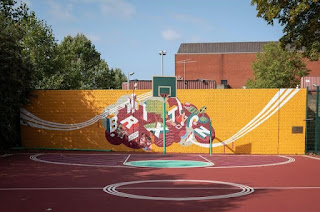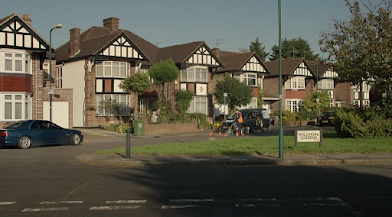The Arrival (2016)
The Arrival (directed by Daniel Montanarini) is a short film about a pregnant woman waiting for the father of her future child to meet her in a cafe. As she's waiting, she's deciding (through voiceover) both whether or not to have a decaf or caffeinated coffee, and also or whether or not to keep the child.
The presentation of a typically inconsequential decision for the average person being such an integral decision for a pregnant woman is interesting, although I have to say this was definitely my least favourite of the set short films. I just found the story sort of eh (also interesting such a story is written by a 'Daniel', can't help but feel it's not exactly 'writing what you know', even if he did make a documentary about mothers) and the use of voiceover just quite boring.
Anyway, I think I'm taking little inspiration from this for my short but it still warrants analysis as the cinematography is technically just flawless and very impressive in a one take scenario.
Narrative
The ending is somewhat closed, as her decision to order a decaf coffee signals to the audience that she's deciding to keep the baby, which in my opinion might be the most uninspiring way to end such a film. Technically some might read it as open because we don't see her say 'I'm keeping it!' in jubilation to the would-be father, but I believe it's entirely coded by Montanarini that her ordering the decaf coffee is essentially the same thing; otherwise why would the entire film be about that inconsequential decision?
Mise-en-scene
The mise-en-scene immediately signposts that we are in a cafe, with booths, coffee cups and a menu. It also simultaneously looks a bit like a train carriage, with the curved lamps on the table and the windows. This is a metaphor for the idea that Anna's pregnancy and everyday decision making is a journey.
Its use of extras is also clever in that it signposts certain events in the story. For example, when an old lady stands in front of the clock, Anna begins to think about how much time she has left before she can't have a baby. Or when a couple walk in through the door, she begins to wonder about her own relationship with the would-be father.
Cinematography
As much as I don't really enjoy the film as a whole, the cinematography is something of a technical feat. The entire film is one shot, with no edits, long, slow dollys and really expressive lighting changes (apparently all controlled live with a semi-automated lighting desk). A great example is when the light starts flickering, as if the cafe really is moving like a train and signifying the journey of her pregnancy.
However, as undoubtedly technically impressive as it was, for me this expressive lighting was almost too heavy handed, especially when it was used as a metaphor for such common ideas (like pregnancy as journey, of course it's true but it's not particularly interesting on its own). Anyway, that's just, like, my opinion man.
.jpg)


Comments
Post a Comment